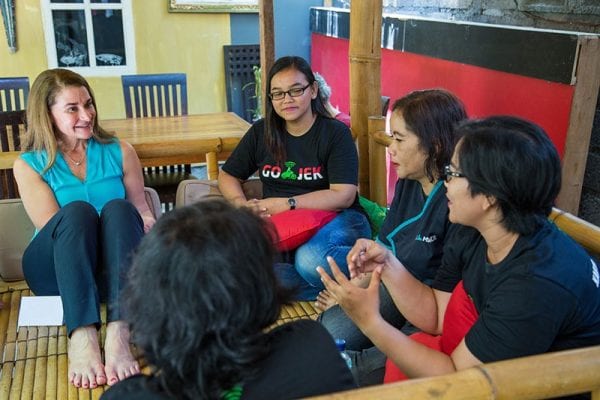That’s according to Bill and Melinda Gates, who have released their latest “annual letter”, listing a number of “surprises” regarding their reflections on 2018 and including some important findings about women.
Such surprises cover everything from new things learnt about Africa, to the potential of at-home DNA testing kits, and what you can learn about processing anger from teenage boys.
But their comments about mobile phone, as well as how data can be sexist, were particularly striking.
There is still a significant gender gap when it comes to mobile internet use and access to mobile phones in developing countries. Recent research on ten countries across Asia, Africa and South America found that women were 40 per cent less like than their male counterparts to use the internet.
As Melinda Gates writes, in rich countries mobile phones make it easier to do things we can usually already do — like send email, look at maps, and get a ride without having to stand on the road waving down a taxi.
But for the world’s most marginalised women, a phone isn’t just about convenience and improving things, they are also enabling them to build an entirely new life because “connectivity is a solution to marginalization.”
“If you’re a woman who has never stepped into a bank, mobile banking offers you a foothold in the formal economy and a chance at financial independence,” she writes.
“If you’re expected to do all the cooking, cleaning, and child-rearing, your income potential improves dramatically as you gain opportunities to connect with customers, trainings, and professional organizations—all from your home. If you’re worried about the stigma you’ll encounter when you ask for contraceptives at your local clinic, an e-commerce delivery platform can help you reassert control over your body and your future.”
She writes that women are not just using phones to access opportunities and services, but also to “change social norms and challenge the power structures that perpetuate gender inequality.”
Melinda Gates also writes about a woman called Nikmah whom she met in Indonesia last year. Nikmah had been trying unsuccessfully to support her three children by selling vegetables — a situation that became even more dire after she escaped an abusive husband. Nikmah now makes a living through Go-Jek, a mobile platform offering food delivers, rides and other services.
Another key ‘surprise’ named in the letter from Bill and Melinda Gates was that “data can be sexist”.
Bill Gates wrote that he’s amazed by how little data there is available on women and girls, and suggests the reason could be due to the fact some issues are classified as “women’s issues”, and then automatically don’t get the indepth study and research required. “That blocks progress for everyone. You can’t improve things if you don’t know what’s going on with half the population. There’s no good reason for that, now that technology makes it so much easier to gather data.”
Melinda Gates then points out that we don’t have data on how much women in developing countries earned in 2018, nor regarding how much property they own or anything particularly detailed on the number of hours girls spend on household chores compared with boys.
Data, she writes, leads to better policies and decisions — it’s the foundation for creating goals and measuring progress, and enabling accountability and advocacy.
She says that it’s not only a matter of women missing from the record — but also that some data is actually sexist, especially if the questions asked in the first place are biased.
She points to the example of income and assets being counted by household, meaning we have little information on how much women earn and, given a husband is often considered the head of the household, anything his wife brings in is often credited to him.
Read the full letter here.


